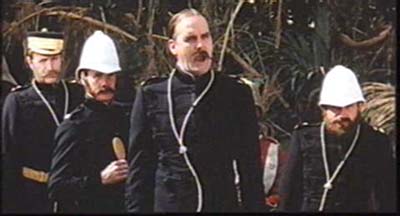by R. H. Cartwright, as told to Brian Kendall
from http://www.heliograph.com/trmgs/trmgs2/ffl.shtml
It was spring of last year when I had the privilege to make the acquaintance of some unique soldiers of France. I was on a hunting trip when, during a sudden stampede of a huge herd of Ruumet Breehr, I became separated from my party. After wandering the Martian deserts for a week with no food or water, my trusty gashant "Cromwell" finally gave out, but I staggered on. Time seemed to stand still, interrupted only by several hallucinations (I rather enjoyed the one that included a large reptile named "Herbie" manning a fish and chips wagon), and I finally fell upon the baked Martian soil to die. Slowly my eyes closed, and I said good-bye (or so I thought) to the world.
"I think he must be English," said a voice in the darkness in, of all languages, French.
"Why?" asked another voice
"Because only an Englishmen would be alone in the middle of this god-forsaken desert."
I remember first thinking "My god, how rude, disturbing my eternal rest like this." Then almost immediately my thoughts switched to, "Oh no! I'm in Hell, for surely if there is a language of Hell, it would have to be French!"
I opened my eyes, expecting to see the horned head of Satan himself laughing at me, but to my surprise (and relief) I saw ten soldiers standing around me.
"Would you like some water?" said the young officer leaning over me. "Bloody right, mate" was the only words my parched lips could get out.
So having meet young Sous-Lieutenant Henri Dagino, we started off back to his posting, at a place called Fort Zinderneuf. I was surprised to find out that my saviors were members of the 2nd Bataillion de Marche, drawn from the world-famous French Foreign Legion. What had started out as being polite interest soon became fascination as I began to grill the young officer on his unit as any good newspaper man would.
It seems that on March 9th, 1831, King Louis-Philippe waved his kingly scepter and created a Foreign Legion to serve outside of France. Since then the Legion has grown and shrunk. It has served in every hemisphere and was even called upon to violate its charter and serve in France during the Franco-Prussian War. In all its battles the legion has maintained itself with the highest standards of bravery and honor.
The soldiers of the Legion on Mars are mostly veterans of the Sudan and Tonkin. Their experiences serve them well on Mars. Most of the soldiers know how to ride and have been trained to serve as mounted infantry; however, the current lack of mounts hampers their ability to function in this capacity.
As for their uniforms on Mars, the standard field dress is white cotton linen shirt and trousers. Most men have been issued the new khaki colonial coat which has a small collar. For the most part the men wear sun helmets, although most officers and NCOs wear a kepi covered by a havelock (a white cloth that covers the neck).
One of the most surprising things to me was the way the men were armed. It seems once the Legion arrived on Mars they received the new Modele 1886 rifle or the "Lebel" as the men call it. Its most unusual feature is its 8-round tubular magazine, but "being a hell of a lot better" than their old Gras rifles, you'll hear no one complaining about this 8mm weapon. To carry more ammo for these weapons, many legionnaires have taken to wearing homemade cloth ammo pouches that are worn across the chest. No two are alike, and quite frankly it takes away from their soldierly appearance.
Unlike English garrisons, however, the Legion has troops trained to man their fort's small howitzers and Maxim guns. This in a way is a strong point because it cuts down on chain of command problems. I'm told for the types of duties the Legion carries out it is effective.
The main weakness of the Legion on Mars as I see it is distance. Each company is given a huge area to patrol. This makes it quite impossible for them to consolidate and present a formidable defense like our grand British columns.
After being in the company of young Dagino for three days I departed with a new respect for these troops of France (words I thought I would never put to print). As the song La Boudin fills the air and the French tricolor is hoisted high into the morning air, my mind swims with the romantic legacy of the Régiment Étranger. So to these forgotten sons of the world, it is to you I dedicate this story Long Live The Legion!












